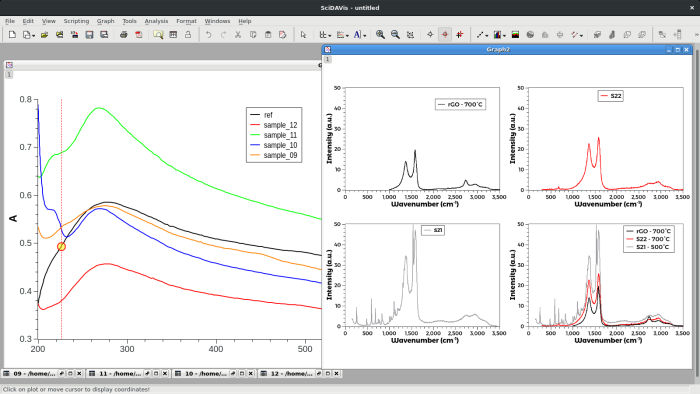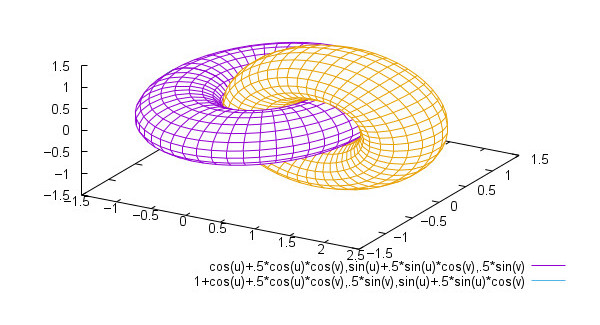SciDAVis is a free interactive application aimed at data analysis and publication-quality plotting.
It combines a shallow learning curve and an intuitive, easy-to-use graphical user interface with powerful features such as Python scriptability and extensibility.
SciDAVis is a dynamic tool, the plots created from data sets and the spreadsheets owing the data are inter-conected. When the spreadsheets are modified, all the objects in the depending plots (curves, axes scales, legends) are automatically updated. For example, deleting a spreadsheet or only some columns will automatically remove all the corresponding curves from the depending plots.
The SciDAVis project started as a fork of QtiPlot with the aim of introducing some changes in design as well as project structure.
Features include:
- Tables (2D data), matrices (3D data), graphs (2D or 3D plots) and notes (text notes or scripts) are gathered in a Project and can be organized using folders.
- Data for tables or matrices can be entered directly or imported from ASCII files.
- Cell values in tables can be computed using standard and special functions (and much more if you have Python installed). Each table cell can be assigned an individual formula.
- Multi-level undo/redo for tables and matrices.
- Many built-in analysis operations like column/row statistics, (de)convolution, FFT and FFT-based filters.
- Extensive support for fitting linear and nonlinear functions to the data, including multi-peak fitting.
- Publication-quality 2D plots of various types including symbols/lines, bars and pie charts which can be exported to a variety of formats (JPG, PNG, EPS, PDF, SVG and more).
- Interactive 3D plots with export to a variety of formats, including EPS and PDF.
- Internationalization support.
- Cross-platform support – runs under Linux, Mac OS X, and Windows.
SciDAVis uses code from QtiPlot.
Website: scidavis.sourceforge.net
Support: Handbook, SciDAVis, Mailing Lists, GitHub Code Repository
Developer: Tilman Benkert, Knut Franke, gbm19, Arun Narayanankutty, Russell Standish and many contributors
License: GNU General Public License version 2 or any later version

SciDAVis is written in C++. Learn C++ with our recommended free books and free tutorials.
| Popular series | |
|---|---|
| The largest compilation of the best free and open source software in the universe. Each article is supplied with a legendary ratings chart helping you to make informed decisions. | |
| Hundreds of in-depth reviews offering our unbiased and expert opinion on software. We offer helpful and impartial information. | |
| The Big List of Active Linux Distros is a large compilation of actively developed Linux distributions. | |
| Replace proprietary software with open source alternatives: Google, Microsoft, Apple, Adobe, IBM, Autodesk, Oracle, Atlassian, Corel, Cisco, Intuit, SAS, Progress, Salesforce, and Citrix | |
| Awesome Free Linux Games Tools showcases a series of tools that making gaming on Linux a more pleasurable experience. This is a new series. | |
| Machine Learning explores practical applications of machine learning and deep learning from a Linux perspective. We've written reviews of more than 40 self-hosted apps. All are free and open source. | |
| New to Linux? Read our Linux for Starters series. We start right at the basics and teach you everything you need to know to get started with Linux. | |
| Alternatives to popular CLI tools showcases essential tools that are modern replacements for core Linux utilities. | |
| Essential Linux system tools focuses on small, indispensable utilities, useful for system administrators as well as regular users. | |
| Linux utilities to maximise your productivity. Small, indispensable tools, useful for anyone running a Linux machine. | |
| Surveys popular streaming services from a Linux perspective: Amazon Music Unlimited, Myuzi, Spotify, Deezer, Tidal. | |
| Saving Money with Linux looks at how you can reduce your energy bills running Linux. | |
| Home computers became commonplace in the 1980s. Emulate home computers including the Commodore 64, Amiga, Atari ST, ZX81, Amstrad CPC, and ZX Spectrum. | |
| Now and Then examines how promising open source software fared over the years. It can be a bumpy ride. | |
| Linux at Home looks at a range of home activities where Linux can play its part, making the most of our time at home, keeping active and engaged. | |
| Linux Candy reveals the lighter side of Linux. Have some fun and escape from the daily drudgery. | |
| Getting Started with Docker helps you master Docker, a set of platform as a service products that delivers software in packages called containers. | |
| Best Free Android Apps. We showcase free Android apps that are definitely worth downloading. There's a strict eligibility criteria for inclusion in this series. | |
| These best free books accelerate your learning of every programming language. Learn a new language today! | |
| These free tutorials offer the perfect tonic to our free programming books series. | |
| Linux Around The World showcases usergroups that are relevant to Linux enthusiasts. Great ways to meet up with fellow enthusiasts. | |
| Stars and Stripes is an occasional series looking at the impact of Linux in the USA. | |
